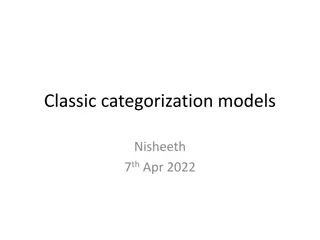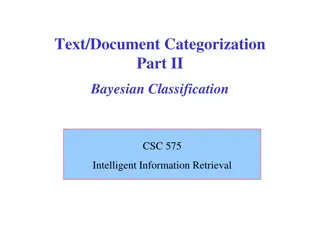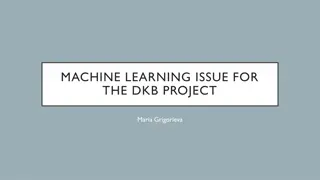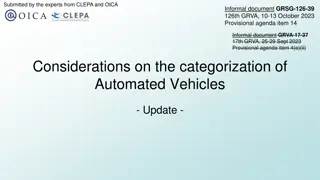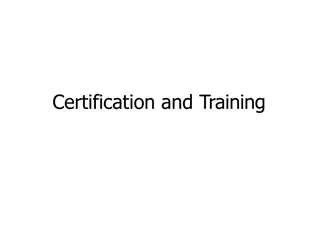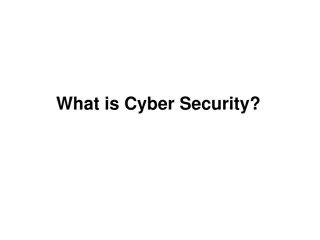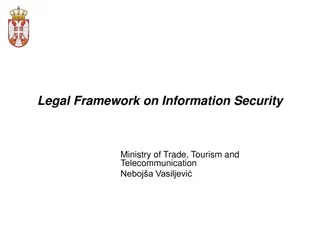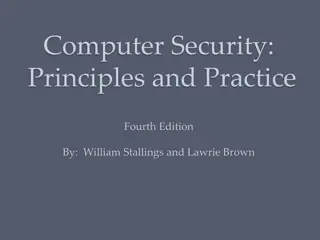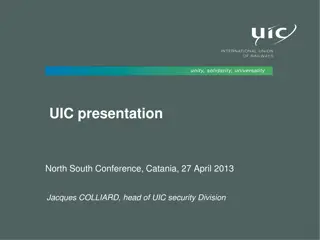Understanding Security Categorization of Information Systems
Explore the concept of security categorization for information and information systems, including its purpose, methodology, key references, and policy statements. Discover how organizations establish protection profiles and assign control settings based on data categories. Learn about the importance of security organization, NIST guidelines, and the need for confidentiality, integrity, and availability in information security.
Download Presentation

Please find below an Image/Link to download the presentation.
The content on the website is provided AS IS for your information and personal use only. It may not be sold, licensed, or shared on other websites without obtaining consent from the author. Download presentation by click this link. If you encounter any issues during the download, it is possible that the publisher has removed the file from their server.
E N D
Presentation Transcript
Data Classification Security Categorization of Information and Information Systems
Security Categorization of Information and Information Systems Purpose: To establish protection profiles and assign control element settings for each category of data for which an Agency is responsible. Security Organization is the basis for identifying an initial baseline set of security controls for the information and information systems. Security Organization starts with the identification of what information and information systems support which State lines of business, as defined by the Federal Enterprise Architecture (FEA). Subsequent steps focus on the evaluation of the need for confidentiality, integrity, and availability.
Security Categorization of Information and Information Systems Has anyone in here completed or begun a Security Categorization study for their area? If you have can you send me a sample of the completed documentation so that OIT can develop consistent format for Collection.
Security Categorization of Information and Information Systems There are two ISD policy statements pertaining to Security Categorization: Standard 500S2-00: Security Categorization of State Information and Information Systems Standard 681S1-00: Information Protection Both these policies will have to be reissued by OIT because they are inconsistent With the NIST guidelines particularly FIPS 199 and SP800-60 Vol 1. which will be the Primary reference utilized in data classification.
Security Categorization of Information and Information Systems Data Classification Methodology Key References FIPS Publication 199, Standards for Security Categorization for Federal Information and Information Systems: http://csrc.nist.gov/publications/fips/fips199/FIPS-PUB-199-final.pdf Information Systems: http//csrc.nist.gov/publications/fips/fips200/FIPS-200-final-march.pdf FIPS Publication 200, Minimum Security Requirements for Federal Information and NIST SP 800-53, Recommended Security Controls for Federal Information Systems Rev.3 http://csrc.nist.gov/publications/nistpubs/800-53-Rev3/sp800-53-rev3-final-errata.pdf Systems into Security Categories: http://nvlpubs.nist.gov/nistpubs/Legacy/SP/nistspecialpublication 800-60v1r1.pdf NIST SP 800-60 Volume 1, Guide for Mapping Types of Information and Information Systems into Security Categories: http://nvlpubs.nist.gov/nistpubs/Legacy/SP/nistspecialpublication 800-60v2r1.pdf NIST SP 800-60 Volume 2, Appendices to Guide for Mapping Types of Information and Information
Security Categorization of Information and Information Systems Two Key Definitions Information Type: A specific category of information (e.g., privacy, Medical, proprietary, financial, investigative, contactor sensitive Security Management) defined by an organization, or in some Instances, by a specific law, Executive Order, directive, policy or Regulation. Information System: A discrete set of information resources organized for the collection processing, maintenance, use, sharing, dissemination, or disposition of Information.
Security Categorization of Information and Information Systems Process Inputs Identify Information Systems 3 Adjust/ Assign 1 2 4 Identify Select Review Finalize System Information Provisional Provisional Information Security Types Impact Levels Impact Levels Impact Levels Category Process FIPS 200 / SP 800-53 Process Outputs Security Security Control Categorization Selection Figure 2: SP 800-60 Security Categorization Process Execution
Security Categorization of Information and Information Systems An information system supporting the provision of electrical energy to the Data Centre contains the following data types: Detailed electrical energy monitoring information Inventory data related to backup electrical generating, UPS systems and related infrastructure devices D.7.1 Energy Supply Information Type Energy Supply involves all activities devoted to ensuring the availability of an adequate supply of energy for the United States and its citizens. Energy Supply includes the sale and transportation of commodity fuels such as coal, oil, natural gas, and radioactive materials. This function also includes distributing and transferring power, electric generation, and/or storage located near the point of use. ; C.3.4.2 Inventory Control Information Type Inventory control refers to the tracking of information related to procured assets and resources with regards to quantity, quality, and location.. a) b)
Information System Name: Power Safe System - DOIT Business and Mission Supported: The Power Safe system provides real- time control and information supporting all backup electrical devices supporting the DOIT Data Center. Information Types Sensor data monitoring backup power for the DOIT Data Center. This function includes control of distribution and transfer of power. The remote control capabilities can take action such as initiating necessary switching actions to alleviate an overloading power condition. The impacts to this information and the system may affect the installation s critical infrastructures. Inventory Control The Power Safe information system processes routine inventory information on all energy production, storage and monitoring devices. Energy Supply Identify Confidentiality Impact Integrity Impact Availability Impact Information Types L / L L / M L / M Due to loss of availability, severe impact to the DOIT Data Center may result and may in-turn have overall consequences facility s infrastructures. Disclosure information may impact the Data indications & warnings of overall capability are provided unfriendly party. of sensor Significant consequences may occur if unauthorized modification of information results in incorrect power system regulation actions. impacts or Center if Energy Supply catastrophic for critical the to an or control Inventory Control L L L Regardless of the moderate or high impact associated with unauthorized disclosure of some inventory control information, the provisional confidentiality impact level recommended for inventory control information is low. The provisional integrity impact level recommended for inventory control information is low. The provisional availability impact level recommended for inventory control information is low. Low Moderate Moderate Final System Categorization: Overall Information System Impact: Moderate
Security Categorization of Information and Information Systems Overall Goal: To complete the Security Categorization Study for Agencies by end of 2016 Calendar year. Action Items: to be consistent with FIPS 199 &200 OIT to rescind and republish any existing policies regarding Security Categorization system categorization information OIT to develop a template for the agencies to record information and information mission. Look for system dependencies i.e. Is there any system that is dependent on data from another system or agency. Agencies to begin the identification of all information systems that impact their agencies to address potential manpower issues. OIT to help define Security Categorization Training for agencies and work with


